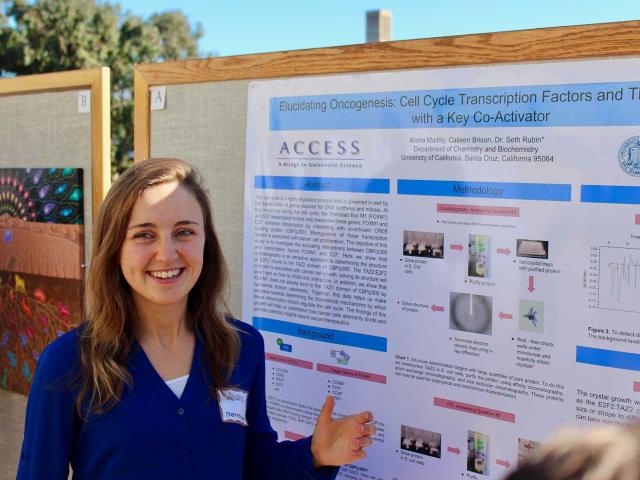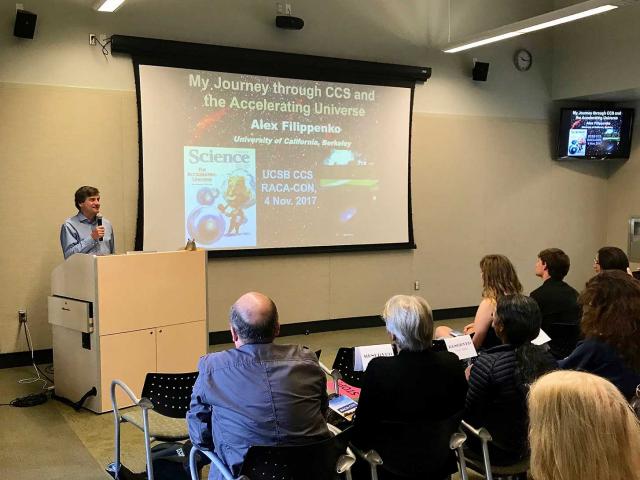Expanding Knowledge
CCS holds first annual Research and Creative Activities Conference
The College of Creative Studies has long adhered to the belief that no research or creative activity is complete until communicated. The Research and Creative Activities Conference (RACA-CON) was founded on this idea and the conviction that collaboration between disciplines expands knowledge.
The first-annual RACA-CON, held on November 4, 2017, at the beautiful seaside Loma Pelona Center on the UC Santa Barbara campus, featured 33 student talks, 55 research posters and pieces of original work, and two alumni keynote speakers. Each of the almost 300 guests listened to talks and viewed posters from all eight CCS majors—Art, Biology, Chemistry/Biochemistry, Computing, Mathematics, Music Composition, Physics, and Writing & Literature.

Conference planning started last Spring and although most academic conferences focus on one topic, the RACA-CON organizing committee set out to establish an interdisciplinary conference to bring together and celebrate all majors. “From the beginning, we wanted to highlight talks and posters from both the sciences and the arts,” said Tengiz Bibilashvili, CCS Physics faculty and member of the RACA-CON Committee. “The interdisciplinary sections were intentional and our goal always was to organize the discussions that already happen every day between students in the College.”
RACA-CON opened and closed with alumni keynote talks by Alex Filippenko (CCS Physics ’79) and Parry Gripp (CCS Literature ’92), respectively. Both inspiring lectures demonstrated how the non-traditional CCS education can, for the right student, provide a path for success. Filippenko, a Miller Senior Fellow in the Miller Institute for Basic Research in Science at UC Berkeley (UCB), spoke about how he turned his childhood passion for science into a career as an astrophysicist. Filippenko, who has won the most prestigious teaching awards at UCB and is one of the most cited astronomers in the world, shared anecdotes about his time at CCS, including a story about how he published his first paper while a CCS student. Gripp is an Emmy-winning songwriter and recording artist. His talk followed a similar theme—how CCS helped him get to where he is today. While describing how he reinvented his career from being the lead singer of the 90’s rock band Nerf Herder to winning an Emmy for a children’s television show, he shared a number of videos from his YouTube channel, which has over 450,000 subscribers and 200 million views.

From a discussion on the discovery of a kilonova to readings of an unpublished novel to explaining convex binary code, each of the 33 student talks was the culmination of many hours of hard work by both the students and their faculty and research mentors. CCS Art student Bailey Clark gave a talk on her fellowship at the Penland School of Crafts, an international center for craft education dedicated to helping people live creative lives in North Carolina. “I started by talking about where I grew up and my influences,” said Clark, “then moved on to describing what Penland is and what my daily responsibilities were as an artist when I got there.” RACA-CON was Clark’s first time giving an academic talk, and she was elated to take part in the event. “It was an awesome experience,” she recounted. “I was really excited to participate and not only share what it means to be an artist, but also hear what the other majors had to say about their fields of research.” Sydney Hunt’s (CCS Biology) presentation, her first at a conference and with her family in attendance—was on the mechanism of the low-concentration citronellal detection in the fruit fly, essentially investigating how insects detect odors. She explained that RACA-CON gave her confidence and prepared her “for all the future conferences I hope to present posters and talks at in my career as a scientist.”
The talks were divided into six sessions, with each section having a medley from both the sciences and humanities. Hence, the students were instructed to organize and present their talks at a level appropriate for a general audience. “I made sure to explain what all of the math and physics terms meant in my presentation,” said Phoebe Coy, a CCS Math student who spoke on her research in hydrodynamics as part of a National Science Foundation REU program at San Diego State this summer. She “focused on the big picture rather than the details, given the broad audience.” Dolev Bluvstein, a CSS Physics student, furthered this sentiment and explained his approach. “I structured the talk in a way that I presented very little data,” said Bluvstein. “I wanted to instill a fascination in exploration because that’s something everyone can connect with, not just the physics.” Although many of the students had previously presented their research, RACA-CON was, for many, their first time giving an academic talk to an audience outside of their field. “This opportunity was extremely helpful in figuring out how to collect all of my main points and condense it in a way that will inspire and interest the general public,” noted Koe Inlow, a fourth-year CCS Biology student who gave a talk on characterizing the biophysical properties of granular nanoparticles embedded in mussel thread cuticle. Learning to captivate an outside audience is an important skill that most undergraduates do not get to practice. This was not lost on the students. “[Speaking to a general audience] is an important skill to develop,” Inlow pointed out. “In order for any scientific research project to be successful, it must be delivered in a way that will make it seem as important to the people as it is to the scientists!”
Since the event coincided with UCSB’s annual Parents Weekend, many CCS parents were in attendance to see the research and original works their students have been working on while at CCS. Although April and Brian O’Dea attended to see their son Nick, their son encouraged them to come regardless. “Nick wanted us to have a chance to learn about the projects being done by CCS students and join in the 50th anniversary celebration,” said Mrs. O’Dea. RACA-CON was an opportunity for parents to chat with their student’s peers and faculty advisor. Mrs. O’Dea explained, “We most enjoyed meeting Nick’s CCS friends both from his major and other majors, and hearing them talk about their projects and research. We really appreciated the friendliness of the students and their willingness to share the results of their creative process and research projects.”
The College intends to continue this tradition—mark your calendars!
This article appeared in the CCS 50th Anniversary Newsletter.